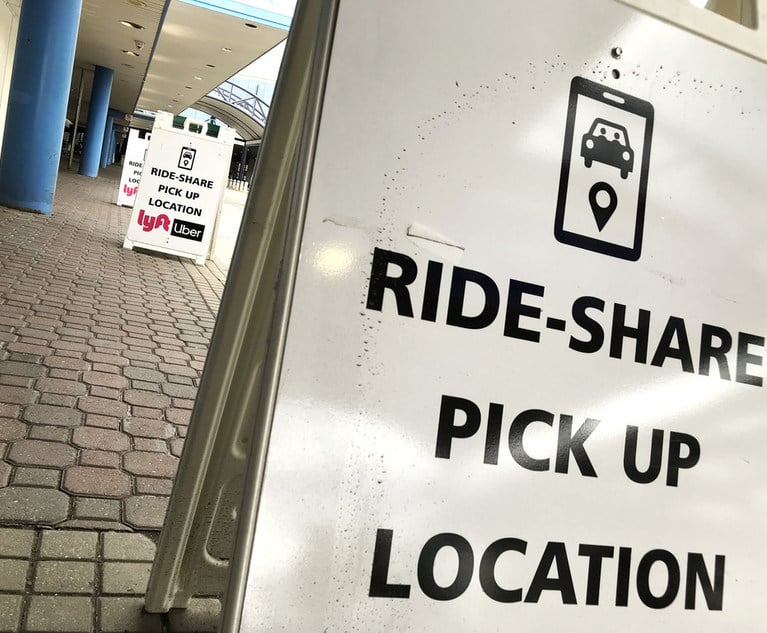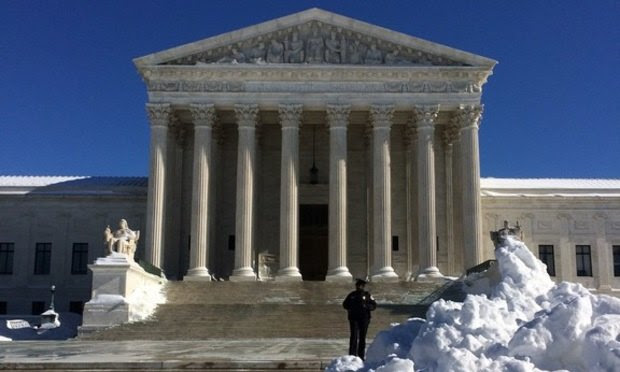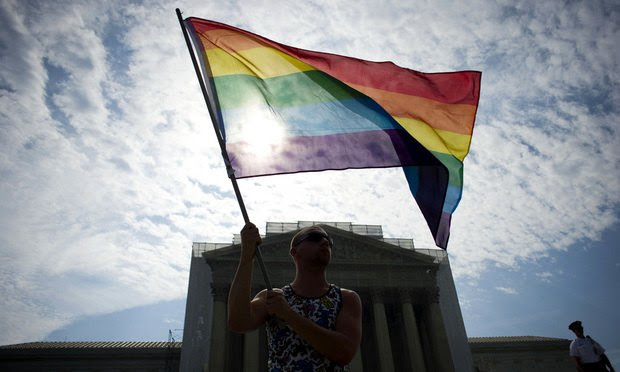Labor of Law: What's Happening Post 'Epic' | Peter Robb's Joint-Employer Criticism | Plus: Around the Water Cooler, and Who Got the Work
There's a lot of movement post-Epic Systems, and we've got a roundup below. Plus: NLRB general counsel Peter Robb says the agency's proposed joint-employer revamp doesn't go far enough. Scroll down for Who Got the Work, and more. Thanks for reading!
December 20, 2018 at 12:20 PM
9 minute read
Welcome to Labor of Law. We've got a roundup of some of the post-Epic Systems developments in the courts—including one federal judge in Pennsylvania who used a sexual harassment case to raise big systemic concerns with what he perceives as the unfairness of mandatory arbitration provisions. NLRB general counsel Peter Robb says the proposed joint-employer revamp doesn't go far enough, and the US Justice Department finds itself in an awkward spot in an LGBT case in Texas. Plus: it's that time of year for holiday parties—here are some L&E implications of workplace gatherings. Our weekly roundup Who Got the Work is below, and we've got the latest labor and employment headlines catching attention. Thanks for reading!
'Epic' Fallout: What's Happening Now
The U.S. Supreme Court's ruling in Epic Systems v Lewis this year promised a renewed confidence in the arbitration procedures that govern a broad swath of corporate America. The divided ruling in May was a win for business advocates, whose employment agreements can prohibit class actions. Here's a snapshot of how the ruling is playing out in the months
>> Companies on the offense. More than half of private, non-union employers in the United States have mandatory arbitration contracts with employees, and observers say that is expected to grow. In at least one example, a company is fighting its own employees for alleged breach-of-contract. Bloomberg reports that Kellogg Co. filed breach of contract claims against former workers who filed a class action alleging over-time violations. The company argues the class claims should be compelled to arbitration. The company is suing the workers … for suing them. The conflict is scheduled for arbitration in February.
>> Plaintiffs attorneys are ready for a fight, too. Companies fought aggressively to defend arbitration as a means to settle workplace disputes. There are cases cropping up now where plaintiffs attorneys are going to court to—wait for it—enforce the terms of arbitration agreements. In many cases, companies are on the hook to pay filing fees and the costs of arbitration—but if a company slow-walks, or doesn't pay at all… that's the problem, and plaintiffs attorneys are suing over it. I recently wrote about such cases against Uber Technologies and Lyft Inc in the Northern District of California. Tens of thousands of individual arbitration claims are in play. At the heart of the claims are worker disputes about driver classification.
Kent Williams of the Williams Law Firm in Minnesota is taking a similar approach in a pending case against Chipotle, where attorneys are filing hundreds of individual arbitration claims. Williams said social media has made it easier for plaintiffs lawyers to find clients, allowing this trend of fighting against arbitration to continue en masse.
>> Conflict remains.The #MeToo movement put a new focus on mandatory arbitration, and some companies responded by opening courthouse doors to victims of sexual harassment. I came across a compelling court ruling the other day that's worth flagging. U.S. District Judge Gerald McHugh in the Eastern District of Pennsylvania used a sexual harassment case to raise broad concerns about what he perceives as the pitfalls of arbitration. (He said he was compelled to rule for the company—you can read my full story here.)
“Even if individual arbitrators adhere to high standards, we ignore reality if we forget that private arbitration services are profit-making enterprises that advertise and compete for business,” McHugh wrote. He said scholars in recent years have “unsettled the notion that arbitration is superior or even sufficiently comparable to litigation. There is certainly some data suggesting that the arbitral forum's downsides may outweigh its benefits, at least for vulnerable workers.”
I'm Erin Mulvaney in Washington, covering labor and employment from the Swamp to Silicon Valley. Follow this weekly newsletter for the latest analysis and happenings. If you have a story idea, feedback or just want to say hi, I'm at [email protected]and on Twitter @erinmulvaney.
Office Parties: What Employers Should Know
The holiday season ushers in traditions of gift-giving and office parties—and headaches for employers. A study from the executive outplacement firm Challenger, Gray & Christmas found employers are less interested in hosting work parties this season, especially if booze is in the mix. The survey found the lowest number of parties reported since 2009, with only two-thirds of companies intending to host a holiday party.
>> Why aren't employers in the holiday spirit? It's not because budgets are tighter. Employers reported higher confidence in the economy than previous years. Some companies said more of their employees are working remote than ever before. But the prevailing theory is increased timidity amid the #MeToo movement. Nearly 58 percent of the companies in the survey said they have addressed sexual harassment issues with their staffs. Plans to serve alcohol also decreased.
>> Any tips? Littler Mendelson has some. Shareholder Helene Wasserman in Los Angeles, co-chair of the firm's litigation and trial practices group, spotlights the “unintended negative consequences for employers.”
“Unlawful sexual harassment has become the most visible employment issue in corporate America. It seems as if every day brings media coverage of further misconduct allegations against prominent leaders and celebrities. Despite their laudable intentions, employers could face liability for the conduct of employees who behave inappropriately at a work event. The office party can become a breeding ground for all kinds of regrettable and potentially unlawful behavior.” Read all her advice here.
A quick work about gifts. Seyfarth Shaw at Work warns holiday gift-giving in the office can be a disaster. Philippe Weiss, president of the compliance services and training subsidiary, says gift-giving should be voluntary. Some advice from Weiss: Buying for bosses could be inappropriate, anything with romantic overtones should be avoided and pressuring group gifts is not a tactful move. Instead, create a policy, keep it simple or consider making donations and avoiding gifting all together.
Who Got the Work
>> Lawyers from Wilmer Cutler Pickering Hale and Dorr are representing Harvard Law School and a team from Munger, Tolles & Olson is representing Harvard Law Review in a case that alleges race and gender discrimination. Texas attorney Jonathan Mitchell represents plaintiff Faculty, Alumni and Students Opposed to Racial Preferences. My colleague Karen Sloan has more on the case here at Law.com.
>> “The Equal Employment Opportunity Commission is limited in what it can ask one of its expert witnesses in an upcoming disability discrimination trial against a Mississippi hospital operated by Wesley Health System LLC.” Bradley Arant Boult Cummings represents Wesley Health. [Bloomberg Law]
>> Tesla is suing former employee Martin Tripp for over $167 million, alleging he hacked confidential company information. Robert Mitchell, an attorney at Tiffany & Bosco who is representing Tripp, told Business Insider that Tesla's damage claims of over $167 million are “absurd.” The law firms Jackson Lewis and Hueston Henniganrepresent Tesla. Read more here.
Around the Water Cooler
>>”The Justice Department is in an awkward spot: It once again is defending a move to protect LGBT rights, despite disagreeing with it. The DOJ is defending the Equal Employment Opportunity Commission in a lawsuit that challenges the commission's position on LGBT rights, even though the two agencies differ on guidance.” [Bloomberg Law] Read the Justice Department's brief here.
>> “The National Labor Relations Board's top lawyer unexpectedly criticized the agency's proposal for determining when multiple companies should share joint liability for labor law violations. The proposal for a “joint employer” liability standard isn't specific or demanding enough and would improperly force certain companies to bargain with unions, NLRB General Counsel Peter Robb suggests in comments released Dec. 19.” [Bloomberg Law] Here's a link to the letter Robb submitted on Dec. 10. Robb wrote: “The proposed rule seems to create a 'one size fits all' standard without addressing how this approach will affect specific industry concerns or business realities.”
>> “You read that right: CBS has been footing the bill for Mr. Moonves's monthslong legal fight against CBS.” Law prof Peter Henning is quoted in this piece: “You get this bizarre result where the company essentially pays someone they fired to sue them.” [The New York Times] Meanwhile my colleague Tom McParland explores how the latest with CBS could tamp down on shareholder litigation.
>> Law firms have been far from immune to claims of pregnancy discrimination over the years. And experts say women are becoming more aware of their rights than ever, so employers of all kinds should be more vigilant about providing a workplace in line with federal and local employment laws. [The American Lawyer]
>> “Uber Technologies Inc. lost a U.K. lawsuit over the employment rights of its drivers, in a landmark judgment that threatens to force companies in the country's burgeoning gig economy to offer benefits such as paid vacations.” [Bloomberg]
>> ”Some of the country's largest pension funds want companies to disclose more information on worker pay, location and the types of jobs their employees do. In a letter reviewed by The Wall Street Journal, the pension funds and some charitable organizations are asking these publicly traded companies to disclose information that goes well beyond what the Securities and Exchange Commission requires.” [WSJ]
>> Tech company workers with stock in their companies are wielding that shareholder power to push for change in their companies. At Amazon, for example, more than a dozen employees pushed for a comprehensive plan addressing climate change. [NYT]
>> What does workplace training look like in the wake of #MeToo? Employers have long maintained written anti-harassment and anti-discrimination policies and have also utilized workplace training both to inform employees about those policies and to arm employees with the parameters of acceptable versus unacceptable workplace behavior. [Law.com]
Happy holidays! Labor of Law will take a hiatus until the first week of January. Thank you so much for reading, and we'll be back in touch in 2019.
This content has been archived. It is available through our partners, LexisNexis® and Bloomberg Law.
To view this content, please continue to their sites.
Not a Lexis Subscriber?
Subscribe Now
Not a Bloomberg Law Subscriber?
Subscribe Now
NOT FOR REPRINT
© 2025 ALM Global, LLC, All Rights Reserved. Request academic re-use from www.copyright.com. All other uses, submit a request to [email protected]. For more information visit Asset & Logo Licensing.
You Might Like
View All
Labor of Law: As Workers Suffer With Long Covid, Employers May Rethink Accommodations for Other Disabilities

Labor of Law: Federal Noncompete Ban Would Be Far From Last Word on Issue

Labor of Law: New Federal Rule Could Upend State Efforts to Count Ride-Share Drivers as Contractors

Labor of Law: Employer Statements on Abortion Could Spur Discrimination, Hostile Work Environment Claims
Trending Stories
Who Got The Work
J. Brugh Lower of Gibbons has entered an appearance for industrial equipment supplier Devco Corporation in a pending trademark infringement lawsuit. The suit, accusing the defendant of selling knock-off Graco products, was filed Dec. 18 in New Jersey District Court by Rivkin Radler on behalf of Graco Inc. and Graco Minnesota. The case, assigned to U.S. District Judge Zahid N. Quraishi, is 3:24-cv-11294, Graco Inc. et al v. Devco Corporation.
Who Got The Work
Rebecca Maller-Stein and Kent A. Yalowitz of Arnold & Porter Kaye Scholer have entered their appearances for Hanaco Venture Capital and its executives, Lior Prosor and David Frankel, in a pending securities lawsuit. The action, filed on Dec. 24 in New York Southern District Court by Zell, Aron & Co. on behalf of Goldeneye Advisors, accuses the defendants of negligently and fraudulently managing the plaintiff's $1 million investment. The case, assigned to U.S. District Judge Vernon S. Broderick, is 1:24-cv-09918, Goldeneye Advisors, LLC v. Hanaco Venture Capital, Ltd. et al.
Who Got The Work
Attorneys from A&O Shearman has stepped in as defense counsel for Toronto-Dominion Bank and other defendants in a pending securities class action. The suit, filed Dec. 11 in New York Southern District Court by Bleichmar Fonti & Auld, accuses the defendants of concealing the bank's 'pervasive' deficiencies in regards to its compliance with the Bank Secrecy Act and the quality of its anti-money laundering controls. The case, assigned to U.S. District Judge Arun Subramanian, is 1:24-cv-09445, Gonzalez v. The Toronto-Dominion Bank et al.
Who Got The Work
Crown Castle International, a Pennsylvania company providing shared communications infrastructure, has turned to Luke D. Wolf of Gordon Rees Scully Mansukhani to fend off a pending breach-of-contract lawsuit. The court action, filed Nov. 25 in Michigan Eastern District Court by Hooper Hathaway PC on behalf of The Town Residences LLC, accuses Crown Castle of failing to transfer approximately $30,000 in utility payments from T-Mobile in breach of a roof-top lease and assignment agreement. The case, assigned to U.S. District Judge Susan K. Declercq, is 2:24-cv-13131, The Town Residences LLC v. T-Mobile US, Inc. et al.
Who Got The Work
Wilfred P. Coronato and Daniel M. Schwartz of McCarter & English have stepped in as defense counsel to Electrolux Home Products Inc. in a pending product liability lawsuit. The court action, filed Nov. 26 in New York Eastern District Court by Poulos Lopiccolo PC and Nagel Rice LLP on behalf of David Stern, alleges that the defendant's refrigerators’ drawers and shelving repeatedly break and fall apart within months after purchase. The case, assigned to U.S. District Judge Joan M. Azrack, is 2:24-cv-08204, Stern v. Electrolux Home Products, Inc.
Featured Firms
Law Offices of Gary Martin Hays & Associates, P.C.
(470) 294-1674
Law Offices of Mark E. Salomone
(857) 444-6468
Smith & Hassler
(713) 739-1250












